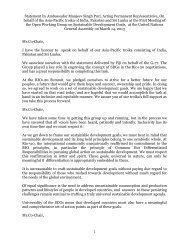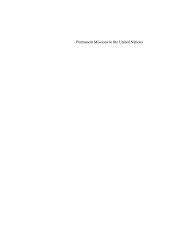statement by mr. tarit baran topdar, member of parliament and ...
statement by mr. tarit baran topdar, member of parliament and ...
statement by mr. tarit baran topdar, member of parliament and ...
You also want an ePaper? Increase the reach of your titles
YUMPU automatically turns print PDFs into web optimized ePapers that Google loves.
STATEMENT BY MR. TARIT BARAN TOPDAR, MEMBER OF PARLIAMENT AND MEMBER<br />
OF THE INDIAN DELEGATION, ON AGENDA ITEMS 107 – FOLLOW-UP TO THE<br />
OUTCOME OF THE MILLENNIUM SUMMIT; 44 – INTEGRATED AND COORDINATED<br />
IMPLEMENTATION OF AND FOLLOW-UP TO THE OUTCOMES OF THE MAJOR UNITED<br />
NATIONS CONFERENCE AND SUMMITS IN THE ECONOMIC, SOCIAL AND RELATED<br />
FIELDS, AND 112 – STRENGTHENING OF THE UNITED NATIONS SYTEM AT THE 63 RD<br />
SESSION OF THE UNITED NATIONS GENERAL ASSEMBLY ON NOVEMEBR 17, 2008<br />
Mr. President,<br />
We welcome the opportunity to participate in this joint debate on the various<br />
agenda items relating to the integrated <strong>and</strong> coordinated implementation <strong>of</strong> <strong>and</strong> followup<br />
to the outcomes <strong>of</strong> the major United Nations conferences <strong>and</strong> summits in the<br />
economic, social <strong>and</strong> related fields. We thank the Secretariat for the report on these<br />
issues.<br />
Mr. President,
United Nations conferences <strong>and</strong> summits held since the 1990s have generated an<br />
unprecedented global consensus on a shared vision <strong>of</strong> development. However, what is<br />
<strong>of</strong> concern is the lack <strong>of</strong> a similar consensus in the matter <strong>of</strong> implementation <strong>of</strong> this<br />
vision. Implementation remains hampered, firstly <strong>by</strong> a continuing lack <strong>of</strong> adequate<br />
resources <strong>and</strong>, further <strong>by</strong> absence <strong>of</strong> an enabling international environment. I do not<br />
need to repeat facts, like the continuing fall in Official Development Assistance flows or<br />
the net outflow <strong>of</strong> resources from developing to developed countries, to highlight the<br />
former. The current ongoing financial crisis, which did not originate in developing<br />
countries but is impairing their development efforts, is just one example <strong>of</strong> the latter.<br />
The 2005 World Summit embraced a broader concept <strong>of</strong> internationally agreed<br />
development goals, not just limited to the Millennium Development Goals. These can<br />
only be reached through the implementation <strong>of</strong> the broader set <strong>of</strong> commitments<br />
undertaken at the major United Nations conferences <strong>and</strong> summits. Further, the different<br />
goals <strong>and</strong> targets adopted at these conferences <strong>and</strong> summits can be achieved only if<br />
they are pursued together, in an integrated manner.<br />
In this regard, we have been repeatedly emphasizing the importance <strong>of</strong><br />
development-oriented international economic, financial <strong>and</strong> trade policies to assist<br />
developing countries in their development initiatives. Globalization, with its<br />
enhancement <strong>of</strong> flow <strong>of</strong> capital <strong>and</strong> goods without sufficient attention to its adverse<br />
impacts, has made the need for such pro-development policies imperative <strong>and</strong> most<br />
urgent. This has been amply demonstrated <strong>by</strong> the current financial crisis, coupled with<br />
the food crisis <strong>and</strong> a higher risk to energy security.<br />
Mr. President,<br />
To ensure that international policies are pro-development, concerns <strong>of</strong><br />
developing countries in the formulation <strong>and</strong> implementation <strong>of</strong> these polices must be<br />
effectively taken on board. Unfortunately, current institutional structures do not permit<br />
this, even though developing countries are the most affected ones. We are heartened<br />
<strong>by</strong> the near global consensus on the need for an urgent <strong>and</strong> fundamental reform <strong>of</strong> the<br />
international financial <strong>and</strong> economic architecture. Such reform must enhance the voice<br />
<strong>and</strong> participation <strong>of</strong> developing countries in the decision-making <strong>and</strong> norm-setting<br />
processes. In order to make this process as inclusive as possible, the United Nations,<br />
with its unique position <strong>and</strong> legitimacy, could play a key role.<br />
Trade must assist countries in their development efforts. An early developmentoriented<br />
outcome <strong>of</strong> the Doha Development Round <strong>of</strong> trade negotiations, which does<br />
not sacrifice the livelihood concerns <strong>of</strong> millions <strong>of</strong> poor <strong>and</strong> marginal farmers, is <strong>of</strong><br />
paramount importance. We also need to accelerate the implementation <strong>of</strong> the<br />
development m<strong>and</strong>ate <strong>of</strong> the Agreement on Trade Related Aspects <strong>of</strong> Intellectual<br />
Property Rights. We must ensure that rewards for innovators must be balanced with
enefits for humankind, particularly in issues like public health, benefit sharing <strong>of</strong> use <strong>of</strong><br />
genetic resources, <strong>and</strong> affordable environment-friendly technologies that are crucial for<br />
addressing climate change <strong>and</strong> related aspects.<br />
Mr. President,<br />
The Economic <strong>and</strong> Social Council has a crucial role in fostering a comprehensive<br />
development agenda <strong>of</strong> the United Nations through an integrated <strong>and</strong> coordinated<br />
implementation <strong>of</strong> the commitments. The Council has an acknowledged role as a<br />
principal body for coordination, policy review, policy dialogue <strong>and</strong> recommendations on<br />
issues <strong>of</strong> economic <strong>and</strong> social development. The strengthening <strong>of</strong> the Economic <strong>and</strong><br />
Social Council in 2006, <strong>and</strong> the incorporation <strong>of</strong> new elements in its functioning, were<br />
useful steps in this regard. We particularly highlight the importance <strong>of</strong> the new m<strong>and</strong>ate<br />
given to the Council in 2006 for undertaking a regular <strong>and</strong> periodic review <strong>and</strong><br />
assessment <strong>of</strong> international economic <strong>and</strong> development policies <strong>and</strong> their impact on<br />
development. We must enhance the capacities <strong>of</strong> the Economic <strong>and</strong> Social Council in<br />
order to effectively implement this m<strong>and</strong>ate, including periodic reviews based on a<br />
development perspective, <strong>of</strong> the policies <strong>of</strong> international financial institutions.<br />
It is satisfying that the Annual Ministerial Review <strong>of</strong> the Economic <strong>and</strong> Social<br />
Council has become an important event to review efforts to achieve the Millennium<br />
Development Goals, <strong>and</strong> learn from sharing <strong>of</strong> experiences. This event must have an<br />
added focus on evaluating the implementation <strong>of</strong> the “global partnership for<br />
development”. The Development Cooperation Forum, which held its first session earlier<br />
this year, must consolidate its unique role in overseeing trends in international<br />
development cooperation. The Council should also continue to discuss topical <strong>and</strong><br />
emerging issues, <strong>and</strong> provide policy inputs <strong>and</strong> guidance. Only through such an<br />
integrated approach can the development agenda be maintained at the core <strong>of</strong> the<br />
efforts <strong>of</strong> the United Nations.<br />
Mr. President,<br />
Strengthening the United Nations system without a comprehensive reform <strong>of</strong> the<br />
UN Security Council is inconceivable. The reform <strong>of</strong> the Security Council must include an<br />
expansion in both permanent <strong>and</strong> non-permanent categories <strong>and</strong> improvement in its<br />
working methods. Let us recall that at the 2005 World Summit, we had pledged for<br />
early reform <strong>of</strong> the Security Council, identifying it as an essential element <strong>of</strong> our overall<br />
efforts to reform the United Nations. The continued delay in reforming the Security<br />
Council illustrates the fundamental deficiency in implementing decisions adopted.<br />
Consultations in the Open-Ended Working Group have outlived their utility. We<br />
are happy that there was unanimous recognition <strong>of</strong> this, <strong>and</strong> Decision 62/557 adopted<br />
on September 15, 2008 agreed to commence intergovernmental negotiations in an<br />
informal plenary <strong>of</strong> the General Assembly, based on proposals <strong>of</strong> Member States, within
a defined timeframe. We fully support the decision <strong>of</strong> the President <strong>of</strong> the General<br />
Assembly to commence these negotiations on November 21, 2008. This is entirely in<br />
line with Decision 62/557, <strong>and</strong> we look forward to the negotiating process producing<br />
concrete results.<br />
The United Nations system also cannot be strengthened without revitalizing the<br />
General Assembly. This must be not simply a technical process concerned with agenda<br />
<strong>and</strong> the technical means employed but a political process where the General Assembly<br />
takes important political decisions on comprehensively reforming the Security Council,<br />
on issues <strong>of</strong> peace under certain circumstances, on having an actual say in the election<br />
<strong>of</strong> the Secretary-General etc. An important part <strong>of</strong> such a reform would be increasing<br />
the accountability <strong>of</strong> the Secretariat to the Member States <strong>and</strong> an increase in the<br />
efficiency <strong>of</strong> the Secretariat.<br />
Before concluding, Mr. President, let me highlight that we are now in the process<br />
<strong>of</strong> negotiating the outcome document <strong>of</strong> the Doha Conference on Financing for<br />
Development. It is important that we do not perpetuate an endless cycle <strong>of</strong><br />
commitments without implementation, <strong>and</strong> the Doha outcome document appropriately<br />
focuses on means <strong>of</strong> implementation.<br />
Thank you, Mr. President.<br />
BACK TO TABLE OF CONTENTS



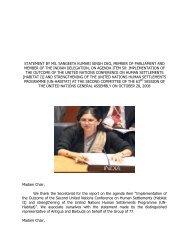
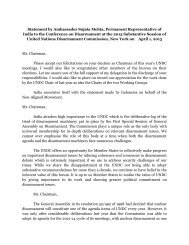
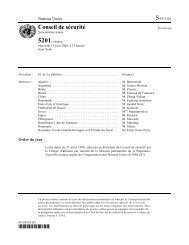
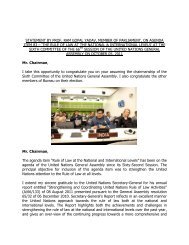
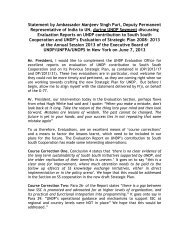
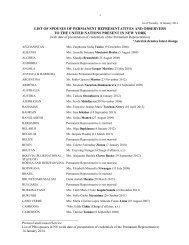
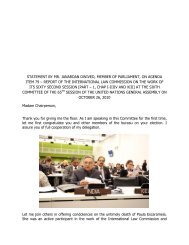
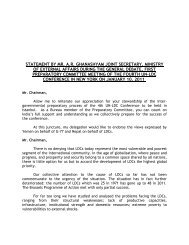
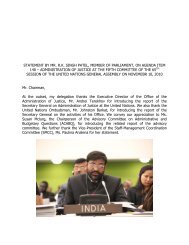
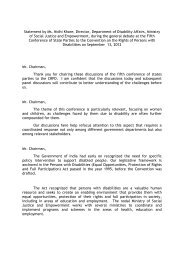
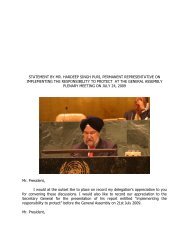
![1 statement by dr.[mrs] kakoli ghosh dastidar - Member States Portal](https://img.yumpu.com/27526598/1/190x245/1-statement-by-drmrs-kakoli-ghosh-dastidar-member-states-portal.jpg?quality=85)
